
ChangeThis
ChangeThis is our weekly series of essays from today's thought leaders that are meant to evoke conversation by bringing forth new and unique ideas.
ChangeThis
-
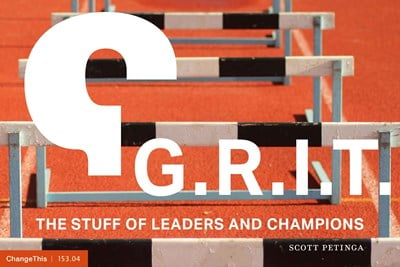
Blog / ChangeThis
G.R.I.T.: The Stuff of Leaders and Champions
By Scott Petinga
"Success is rarely, if ever, easily obtained. It rises from the ashes of multiple failures like the proverbial phoenix, having to be fought for, chased and desired above all else. That is particularly true in this day and age when competition is fiercer, criticism is deeper, and expectations are higher. A thousand and one obstacles will be thrown up along your journey, seeking to stop your career and even your very existence. I know because I have failed at most things in my life and was even diagnosed with cancer. I shouldn't be a success, but I learned to apply certain foundational characteristics that I have found to be the 'stuff' of entrepreneurs, leaders, and champions."
Categories: changethis
-
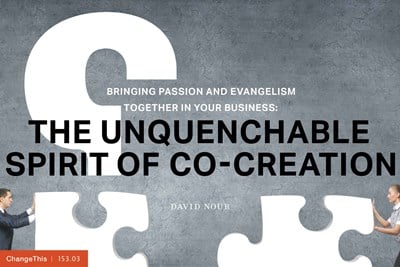
Blog / ChangeThis
Bringing Passion and Evangelism Together in Your Business: The Unquenchable Spirit of Co-Creation
By David Nour
"Do you co-create value with others? Do you understand—deep in your gut—that you cannot succeed in the future by going at it alone? Co-creation means banding together with another organization or person to build something together that you could not have built alone. To do this right, you must intertwine your futures together in a highly significant manner. Taking a step like that requires the heartfelt belief that the two of you are much better off together than you were on your own. This belief must survive obstacles, setbacks, delays, disappointment, and even (gasp) looming failure."
Categories: changethis
-
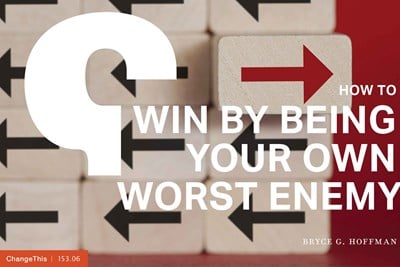
Blog / ChangeThis
How to Win by Being Your Own Worst Enemy
By Bryce G. Hoffman
"Many of the business tools we have relied on for decades no longer work in a world where incremental improvement is not enough to stay in business, let alone succeed in it. We need new processes, new methodologies, and new ways of thinking if we are to become one of the disruptors, rather than one of the disrupted. One of the most promising and powerful of these new approaches is red teaming—a system developed by the military and intelligence agencies after 9/11 to help organizations stress-test their strategies, challenge their assumptions, and make better decisions. How? By becoming their own worst enemy."
Categories: changethis
-
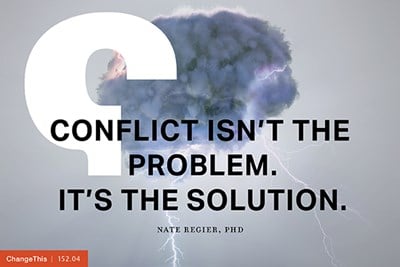
Blog / ChangeThis
Conflict Isn't The Problem. It's The Solution.
By Porchlight
"It's not surprising that when I Google the word 'conflict,' the terms 'resolution,' 'mediation,' 'management,' and 'reduction' pop up. All of these words convey an important message about our association with conflict; that it needs to be managed, reduced, resolved and mediated. The problem with conflict mediation, conflict management, and conflict reduction is that each one positions conflict as the culprit. Whether intended or not, these labels and much of the methods used in the conflict and communication fields reinforce the misconception that if we can remove the conflict, things will be better. When we mediate, manage, or reduce the conflict, we necessarily reduce the energy available for productive problem-solving. When we respect the tension and use that energy to create instead of destroy, the results can be transformative."
Categories: changethis
-
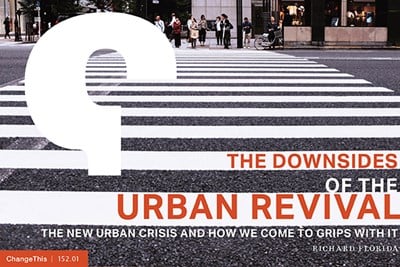
Blog / ChangeThis
The Downsides of the Urban Revival: The New Urban Crisis and How We Come to Grips With It
By Richard Florida
"In little more than a decade, the revitalization of our cities and our urban areas that I had predicted was giving rise to rampant gentrification and unaffordability, driving deep wedges between affluent newcomers and struggling longtime residents. What troubled me most of all was the decline of the great middle-class neighborhoods that had formed the backbones of our cities and broader society for most of my life. This was the kind of neighborhood I'd been born into, in Newark, and grown up in, in North Arlington. This was the kind of neighborhood I had hoped the new creative class was bringing back to our cities. But now, these once sturdy middle-class neighborhoods were disappearing right before my eyes. I entered into a period of rethinking and introspection, of personal and intellectual transformation, of which this book is the result. I began to see the back-to-the-city movement as something that conferred a disproportionate share of its benefits on a small group of places and people.
Categories: changethis
-
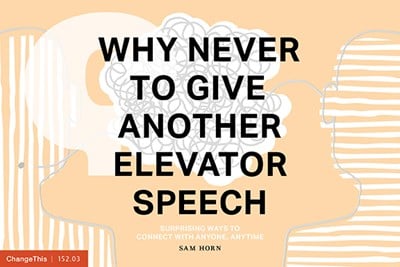
Blog / ChangeThis
Why NEVER to Give Another Elevator Speech: Surprising Ways to Connect with Anyone, Anytime
By Sam Horn
"Never again give an elevator SPEECH. Never again explain what you do and/or what you're trying to get a YES to. Never again 'Tell people what you're going to tell them.'
Categories: changethis
-
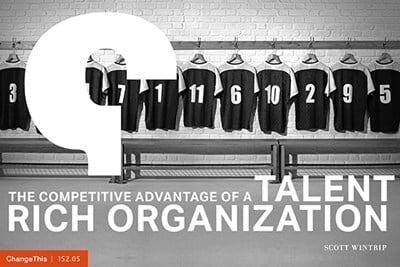
Blog / ChangeThis
The Competitive Advantage of a Talent Rich Organization
By Scott Wintrip
"When it comes to success in business, one measure alone can accurately predict the future—wealth of talent. The more talent wealth an organization has, the more successful that organization will be. We've all experienced the benefits of organizations that are rich in talent. These are the companies we've come to love. When we say we love a company, what we're really saying is we love the work being done by the exceptional people in these organizations. People are the reason why Apple, Alphabet (Google), Amazon.com, and Starbucks remain some of the world's most admired companies. That's why having a wealth of talent is so important for all organizations. Talented employees who do outstanding work are the secret ingredients that make their companies great."
Categories: changethis
-
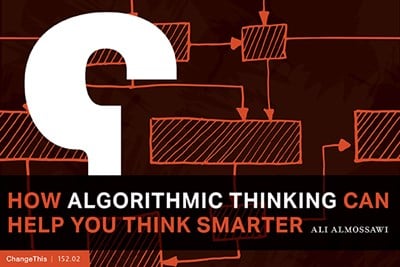
Blog / ChangeThis
How Algorithmic Thinking Can Help You Think Smarter
By Ali Almossawi
"What's fascinating is that Babylonian tablets from the second millennium BCE reveal that ancient Babylonians wrote down their procedures for determining things like, say, compound interest or the width and length of a cistern given its height and volume using algorithms. And all throughout history, and in a variety of domains, one can see approaches to problems that resemble what we refer to today as algorithms. That realization is intriguing for a number of reasons. One, it shows that this way of thinking about problems is rooted in ancient history. Two, it shows that it is domain-agnostic. And so, if one were to consider how best to make algorithms compelling to the broadest audience, it seems only natural to strive to not sell the field short, by describing it in its narrowest form, but to rather frame it as a tool for thinking, and a general-purpose one at that. One that can be applied to everyday problems that may have nothing at all to do with computers."
Categories: changethis
-
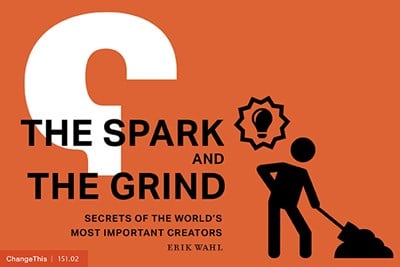
Blog / ChangeThis
The Spark and the Grind: Secrets of the World's Most Important Creators
By Erik Wahl
"Generating creativity takes an effort to make the initial spark. Thomas Edison once locked himself and five coworkers in his lab, where they labored for sixty hours without sleep to finish a working printing machine. This is the first truth you have to understand about creative endeavors: the spark comes to life at the expense of the grind. You will always run into problems when your efforts stop at the initial spark because rarely is the first spark the hottest and most potent. This was clearly true with Edison, who went on to win more than a thousand patents—including the light bulb—by working eighteen-hour days most of his life and famously finding '10,000 ways that won't work.'"
Categories: changethis
-
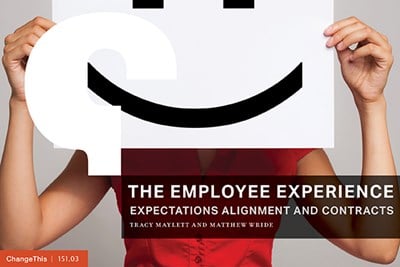
Blog / ChangeThis
The Employee Experience: Expectations Alignment and Contracts
By Tracy Maylett, Matthew Wride
"Some mistakenly confuse the Employee Experience (EX) with popular terms like Talent Management, Human Resources Development, or Employee Engagement. While EX is certainly related to those terms, it's not synonymous with them. Employee Experience is much broader in scope. The Employee Experience is the sum of perceptions employees have about their interactions with the organization in which they work, and an effective Employee Experience doesn't come to pass without aligned expectations."
Categories: changethis
The original idea behind ChangeThis came from Seth Godin, and was built in the summer of 2004 by Amit Gupta, Catherine Hickey, Noah Weiss, Phoebe Espiritu, and Michelle Sriwongtong. In the summer of 2005, ChangeThis was turned over to 800-CEO-READ. In addition to selling and writing about books, they kept ChangeThis up and running as a standalone website for 14 years. In 2019, 800-CEO-READ became Porchlight, and we pulled ChangeThis together with the rest of our editorial content under the website you see now. We remain committed to the high-design quality and independent spirit of the original team that brought ChangeThis into the world.

